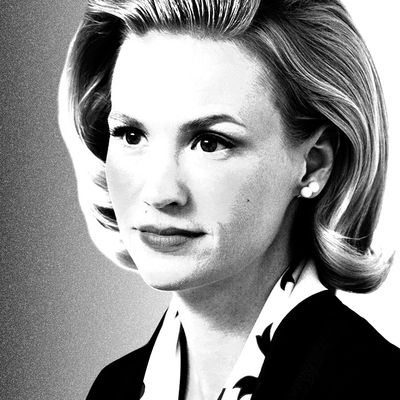
Reading old Mad Men reviews feels like opening up a crinkly old newspaper and revisiting another era. “While watching ‘Mad Men,’ a person gets the sensation that she’s looking at a classic in the making,” Melanie McFarland wrote in the Seattle Post-Intelligencer back in 2007. As we prepare to say good-bye, we’re looking back at the early word on the show — some reviewers were damn near prescient, and some (including this publication) were simply on the wrong side of history.
“Have any states yet legalized marriage between human beings and TV shows? If so, I’m going to throw a few things in a bag and run off with ‘Mad Men,’ the new drama on AMC set in the world of advertising at the dawn of the sixties — and encompassing New York life, and marriage, and sex, and repression, and what America was and was not. It is gorgeous in every way. As it should be — it’s the spawn of all those handsome, stylish office movies that were made in the fifties. Like those movies, ‘Mad Men’ is smart and tremendously attractive, and it stirs you more than it probably should. It may not be deep, but if you’re a certain age and have a certain sensibility and certain fantasies of what New York used to be like (thanks to those movies) it hits a deep place in you, like a straight-up Martini made of memory and desire.”
—Nancy Franklin, The New Yorker
“Despite high praise from the Times, People, and the Los Angeles Times (‘The pilot of AMC’s new original series “Mad Men” is not so much a pilot as an hourlong seduction’), ‘Mad Men’ is ultimately as self-indulgent and annoying as its terminally repressed characters… Then there are so many references to how none of the characters–even pregnant women–seriously believe cigarettes are bad for them (insert annoying ‘we know better now’ coughing fit here), it’s maddening. I get it: It’s 1960! Now move on … ‘Mad Men,’ it turns out, is all ambience and no action. For all the effort put into making the sets as vivid as possible, the show sorely lacks for character development. Like a bad soap opera, the only plot seems to be a mind-numbingly slow march toward sex…Sometimes it seems that what Weiner wants you to get is that we were dumb as rocks in 1960. When Betty Draper notices her daughter running around the house with a plastic dry-cleaning bag over her head, she chastises the child for removing the clothes–not for endangering herself. I guess we didn’t have suffocation back in 1960.”
—Sacha Z. Scoblis, The New Republic
“‘Mad Men,’ which premiered Thursday, sets the bar extremely high for the competition, both summer and fall. Presenting the most vivid picture of early ’60s social oddities that I can recall — Chain-smoking pregnant ladies! Kids without seat belts! Philandering galore! — ‘Mad Men’ offers a snapshot of bygone times that is a pure joy to watch, from the incredible costumes and sets to the deliciously claustrophobic depiction of work and domestic life it presents. Creator Matthew Weiner, who was an executive producer for ‘The Sopranos,’ doesn’t settle for the same old clichéd dialogue found in other dramas. The writing here is snappy and clever, and every scene has something to hold our attention or surprise us …‘Mad Men’ is smart, funny, eye-opening, and probably 10 times better than anything you’ll see this fall, so don’t miss it.”
—Heather Havrilesky, Salon.com
“Jon Hamm stars as a hotshot creative director at a New York advertising agency that is equally eager, in 1960, to sell cigarettes and Richard Nixon. John Slattery is the silvery boss who looks over his shoulder; Vincent Kartheiser, a lean and hungry account executive who would stab him in the back; Elisabeth Moss, the new girl from the steno pool; and there are many more, all waiting around for Marshall McLuhan to forgive them for their many crimes against intelligence and decency. They look a lot like the television journalists in George Clooney’s Edward R. Murrow movie—without, of course, the scruples. Odd how ridiculous they seem in their dark narrow suits with their dark narrow ties, like Murrow, Ed Sullivan, Lenny Bruce, Rod Serling, and Sinatra’s Rat Pack. So, too, does this series feel like a fifties leftover, chock-full of unimportant secrets.”
—John Leonard, New York Magazine
“A fizzy drama that makes you smile without needing jokes, Mad Men — punny slang for hot-blooded Madison Avenue ad executives — takes us back to the early ’60s, when guys wore narrow-lapelled suits, guzzled bourbon before and after meetings, and smoked like a Neil Young guitar solo.”
—Ken Tucker, Entertainment Weekly
“Men wore white shirts, drank Manhattans and harassed compliant secretaries in the elevator. Everybody read Reader’s Digest. Jews worked in Jewish advertising agencies, blacks were waiters and careful not to seem too uppity, and doctors smoked during gynecological exams. Women were called ‘girls.’ Men who loved men kept it to themselves. The magic of ‘Mad Men’ is that it softly spoofs those cruel, antiquated mores without draining away the romance of that era: the amber-lit bars and indigo nightclubs, soaring skyscrapers, smoky railway cars and the brash confidence that comes with winning a war and owning the world. It’s a sardonic love letter to the era that wrought ‘The Man in the Gray Flannel Suit’ and ‘The Best of Everything,’ but homage is paid with more affection than satire.”
—Alessandra Stanley, the New York Times
“Before exploring all that’s captivating in ‘Mad Men,’ you should know this: ‘Mad Men’ is a minutely examined character study, and though it has wonderful moments of dark humor and sly sexuality, it does not leap entertainingly off the screen like two forthcoming series about individuals or couples in crises, HBO’s ‘Tell Me You Love Me’ and Showtime’s ‘Californication,’ both interesting and evocative in their own right. No, ‘Mad Men’ is infinitely more sophisticated in its storytelling (taking nothing away from the two others) and each hour unfolds like a small movie. It’s a testament to the writing prowess and original vision of Weiner, who worked for years on ‘Mad Men’ as a side project while getting paid to do other TV work, most notably ‘The Sopranos,’ where he was a writer and executive producer… There is likely to be a rising amount of hype around ‘Mad Men,’ because it is the dark horse surprise of the summer and fall TV season so far.”
—Tim Goodman, the San Francisco Chronicle
“High praise and hyperbole surround ‘Mad Men,’ enough to make a person wary as to whether it can live up to the hype. Such is the double-edged nature of buzz, or too much of it. All the raves and accolades are so thundering and heavy that you may be inclined to think it couldn’t possibly be as good as all the early noise over it. In this case, pretend there’s no hype. If it makes it easier for you to tune in, think of AMC’s new drama, which premieres Thursday night at 10, as some wonderful discovery you happened upon, in spite of its slick promotion and attractive premise…while watching ‘Mad Men,’ a person gets the sensation that she’s looking at a classic in the making.”
—Melanie McFarland, Seattle Post-Intelligencer
“Played to slick perfection by Jon Hamm, Don Draper is the slippery figure at the center of ‘Mad Men,’ a really extraordinary new drama on, of all places, AMC. He’s one of the head sharks in a tank of ruthless Mad men — Madison Ave. ad men — whose mission is to seduce an increasingly savvy public. The series, tonight at 10, is set at that moment right before America woke up from the 1950s. Don and his co-conspirators at the Sterling Cooper agency are watching helplessly as the rules of their game change daily, as the culture wars — over women’s rights, diversity, divorce, health concerns — begin to kick in. But please don’t think ‘Mad Men’ is merely nostalgia. It’s so much richer than that. The show is layered with still-resonant ideas, about the oppressive reign of bottled-up WASPS in ties, about whether love is, as Don puts it, ‘invented by guys like me to sell nylons.’”
—Matthew Gilbert, the Boston Globe
“This is a place TV hasn’t visited before, where you want to linger, and people you haven’t seen on TV before whom you want to know better. And it’s another basic-cable breakthrough in a summer in which the broadcast networks have gone stone-cold. Created by The Sopranos producer Matthew Weiner, Mad Men explores that twilight time between the end of the Eisenhower era and the arrival of The Beatles, when an exploding economy brought advertising to previously unimagined heights. Businessmen’s hair was short and slick, women’s figures were wildly exaggerated, and everyone was, quite literally, blowing smoke.”
—Robert Bianco, USA Today


